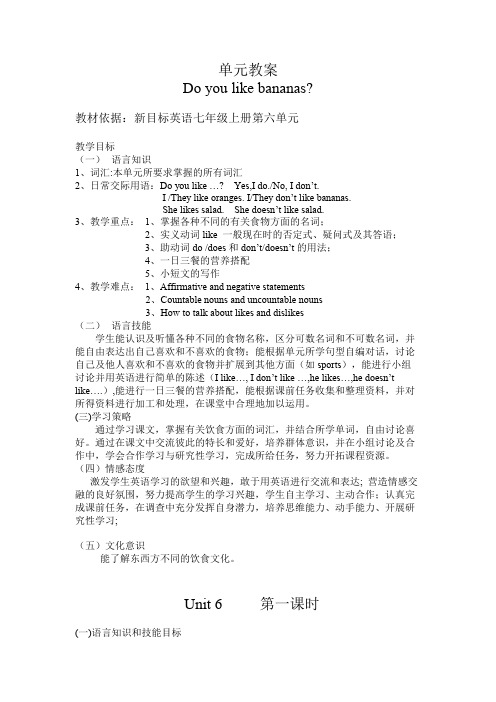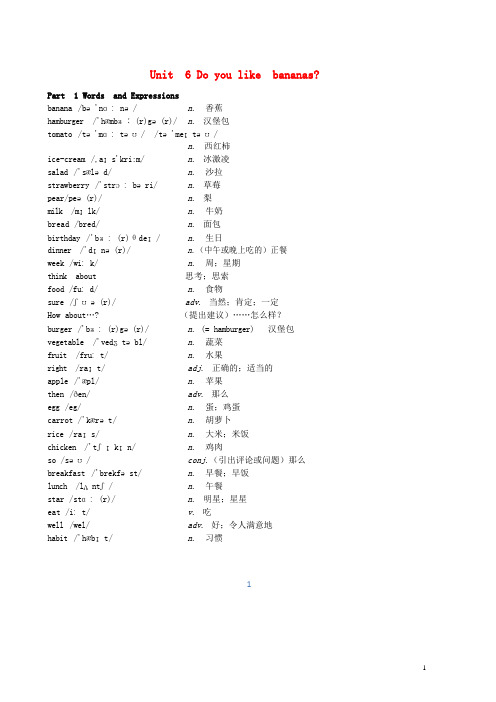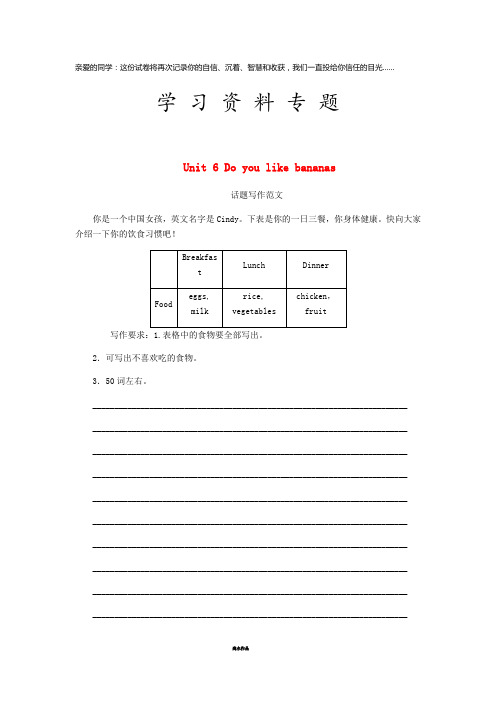新人教版七年级英语上册unit6_Do_you_like_bananas_Section_A-1课件
人教版七年级上册英语讲义 Unit 6 Do you like bananas

Unit 6 Do you like bananas? 讲义一、【重点单词】banana /bə'nɑ:nə/香蕉hamburger /'hæmbɜ:(r)ɡə(r)/汉堡包tomato /tə'mɑ:təʊ/西红柿ice-cream /,aɪs'kri:m/冰激凌salad /'sæləd/沙拉strawberry /'strɔ:berɪ/草莓pear /peə(r)/梨milk /mɪlk/牛奶bread /bred/面包birthday /'bɜ:(r)θdeɪ/生日dinner /'dɪnə(r)/(中午或晚上吃的)正餐week /wi:k/周;星期food /fu:d/食物sure /ʃʊə(r)/当然;肯定;一定burger /'bɜ:(r)ɡə(r)/汉堡包= hamburgervegetable /'veʤtəbəl/蔬菜fruit /fru:t/水果right /raɪt/正确的;适当的apple /'æpl/苹果then /ðen/那么egg /eɡ/蛋;鸡蛋carrot /'kærət/胡萝卜rice /raɪs/大米;米饭chicken /'ʧɪkɪn/ji鸡肉so /səʊ/ (引出评论或问题)那么breakfast /'brekfəst/早餐;早饭lunch /lʌnʧ/午餐star /stɑ:(r)/明星;星星eat /i:t/吃well /wel/好;令人满意的habit /'hæbɪt/习惯healthy /'helθi/健康的really /'ri:əli/真正地question /'kwesʧən/问题want /wɒnt/需要;想要be /bi:/变成fat /fæt/肥的;肥胖的二、【重点短语】1. John ’s birthday dinner 约翰的生日宴会2. vegetable salad 蔬菜沙拉3. two tomatoes 两个西红柿4. eat well 吃得营养5. think about 考虑6. eat/have breakfast/lunch/dinner 吃早/午/晚饭7. sports stars 体育明星8. the volleyball star 排球明星9. ask sb. about sth. 问某人某事10. like hamburgers/ice-cream 喜欢汉堡包/冰淇淋11. like eating eggs 喜欢吃鸡蛋12. her eating habits 她的饮食习惯13. be (not) healthy (不)健康14. one last question 最后一个问题15. healthy food 健康食物16. after breakfast/lunch/dinner 早/午/晚饭后17.one last question 最后一个问题18.some fruit 一些水果19.for dinner 作为晚餐20.how about 怎么样三、【重点句型】1.—Do you like salad? 你喜欢沙拉吗?一Yes,I do. /No, I don’t. 是的,我喜欢。
七年级英语上册人教版Unit6Do you like bananas?单元教案

单元教案Do you like bananas?教材依据:新目标英语七年级上册第六单元教学目标(一)语言知识1、词汇:本单元所要求掌握的所有词汇2、日常交际用语:Do you like …? Yes,I do./No, I don’t.I /They like oranges. I/They don’t like bananas.She likes salad. She doesn’t like salad.3、教学重点:1、掌握各种不同的有关食物方面的名词;2、实义动词like 一般现在时的否定式、疑问式及其答语;3、助动词do /does和don’t/doesn’t的用法;4、一日三餐的营养搭配5、小短文的写作4、教学难点:1、Affirmative and negative statements2、Countable nouns and uncountable nouns3、How to talk about likes and dislikes(二)语言技能学生能认识及听懂各种不同的食物名称,区分可数名词和不可数名词,并能自由表达出自己喜欢和不喜欢的食物;能根据单元所学句型自编对话,讨论自己及他人喜欢和不喜欢的食物并扩展到其他方面(如sports),能进行小组讨论并用英语进行简单的陈述(I like…, I don’t like …,he likes…,he doesn’t like….),能进行一日三餐的营养搭配,能根据课前任务收集和整理资料,并对所得资料进行加工和处理,在课堂中合理地加以运用。
(三)学习策略通过学习课文,掌握有关饮食方面的词汇,并结合所学单词,自由讨论喜好。
通过在课文中交流彼此的特长和爱好,培养群体意识,并在小组讨论及合作中,学会合作学习与研究性学习,完成所给任务,努力开拓课程资源。
(四)情感态度激发学生英语学习的欲望和兴趣,敢于用英语进行交流和表达; 营造情感交融的良好氛围,努力提高学生的学习兴趣,学生自主学习、主动合作;认真完成课前任务,在调查中充分发挥自身潜力,培养思维能力、动手能力、开展研究性学习;(五)文化意识能了解东西方不同的饮食文化。
人教版2020年七年级英语上册Unit6Doyoulikebananas讲义(新版)人教新目标版

Unit 6 Do you like bananas?Part 1 Words and Expressionsbanana /bə'nɑːnə/ n. 香蕉hamburger /'hæmbɜː(r)gə(r)/ n. 汉堡包tomato /tə'mɑːtəʊ/ /tə'meɪtəʊ/n. 西红柿ice-cream /,aɪs'kri:m/ n. 冰激凌salad /'sæləd/ n. 沙拉strawberry /'strɔːbəri/ n. 草莓pear/peə(r)/ n. 梨milk /mɪlk/ n. 牛奶bread /bred/ n. 面包birthday /'bɜː(r)θdeɪ/ n. 生日dinner /'dɪnə(r)/ n.(中午或晚上吃的)正餐week /wiːk/ n. 周;星期think about 思考;思索food /fuːd/ n. 食物sure /ʃʊə(r)/ adv. 当然;肯定;一定How about…?(提出建议)……怎么样?burger /'bɜː(r)gə(r)/ n. (= hamburger) 汉堡包vegetable /'vedʒtəbl/ n. 蔬菜fruit /fruːt/ n. 水果right /raɪt/ adj. 正确的;适当的apple /'æpl/n. 苹果then /ðen/adv. 那么egg /eg/ n. 蛋;鸡蛋carrot /'kærət/ n. 胡萝卜rice /raɪs/ n. 大米;米饭chicken /'tʃɪkɪn/ n. 鸡肉so /səʊ/ conj.(引出评论或问题)那么breakfast /'brekfəst/ n. 早餐;早饭lunch /lʌntʃ/ n. 午餐star /stɑː(r)/ n. 明星;星星eat /iːt/ v. 吃well /wel/ adv. 好;令人满意地habit /'hæbɪt/ n. 习惯1healthy /'helθi/adj. 健康的really /'riːəli/ adv. 真正地question /'kwestʃən/ n. 问题want /wɒnt/ v. 需要;想要be /biː/ v. 变成fat /fæt/adj. 肥的;肥胖的Part 2:Texts课文(一)Jack: Hey, John’s birthday dinner is next week. Let’s think about the food.Tom: Sure. How about burgers, vegetable salad, and some fruit? Bill: Sounds good. John likes hamburgers.Jack: Oh, I don’t like salad.Bill: But John likes salad, and it’s his birthday.Jack: Yes, you’re right. What about the fruit?Tom: I think John likes strawberries and apples.Jack: OK. Let’s have strawberries and applesthen.Structure——谈论好恶1.Do you like salad? Yes, I do./No, I don’t.2.Do they like pears? Yes, they do./ No, they don’t.3.Does she like tomatoes? Yes, she does./ No, she doesn’t.4.I like oranges. I don’t like bananas.5.We like rice. We don’t like hamburgers.6.He likes ice-cream. He doesn’t like vegetables.重点句型:—Do / Does sb. like…?—Yes, sb. do / does.—No, sb. don’t / doesn’t.sb. like/likes ….sb. don’t/doesn’t like ….Underline the correct words in the brackets.在括号内正确的单词下画线。
人教版七年级上Unit6_Do_you_like_bananas)课件

1. Write down the conversation(2c) between your and your partner.
2. Write a report according to the survey.
Unit 6 Do you like bananas
Aims and Language points:
2. -Let’s think about the food.
-Sure.
-让我们想想(吃什么)食物吧。 -当然。/没问题
think about “对…有(某种观点); 回想起;考虑”
Eg. You can think about it. 你可以把这事考虑一下。
Sure.
What do you think about him? 你觉得他这人怎么样?
中用助动词does。 疑问句和否定句中用到does后,谓语动词用原形(like).
Let’s chant
Join us, join us. Let’s have a party. Do you like salad ? Yes, I do. Do you like bread ? No, I don’t. Does he like apples ? Yes, he does. Does she like pears? No, she doesn’t. Do they like hamburgers? Yes, they do. I see. I see. Let’s have a party.
Do you like …?
Names
tomatoes
ice-cream
hamburger s
2a.Listen and circle the food. (Students’ Book Page 32)
新版七年级初一上册第六课英语Unit 6 Do you like bananas

He/ She/ It likes… He / She/ It doesn’t like…
PPT模板下载:/moban/ 节日PPT模板:/jieri/ PPT背景图片:/beijing/ 优秀PPT下载:/xiazai/ Word教程: /word/ 资料下载:/ziliao/ 范文下载:/fanwen/ 教案下载:/jiaoan/
1.---Does Tom like bananas? ---_____, No ____ he _______. doesn’t But Rose does.
likes 2.My mother ______salad. But I don’t like.(like 3.Do you like apples ___________? (apple) doesn’t 4.She _______ like ice cream. 5.They like hamburgers.(一般疑问句) Do they like hamburgers?
lunch Tom’s
Tom’dinner s
Sandra has/likes eggs, apples and bananas for breakfast. Tom has/likes … for lunch.
返回
He has … He doesn’t have… He likes … He doesn’t like…
2. salad是西餐中一道经典的凉拌菜。传统的沙拉是将洗 净、切成块状或片状的生蔬菜(通常包括生菜、黄瓜 和西红柿等)与沙拉酱混合,均匀搅拌即可。沙拉也 有水果沙拉(fruit salad)、土豆沙拉(potato salad)、海鲜沙拉(seafood salad)等各个品种。
Exercises
七上Unit6_Do_you_like_bananas(section_A)

Do they like strawberries ?
Yes , they do .
They like strawberries .
Does he like milk … ?
Yes , he does .
He likes milk.
Rewrite the sentences:
1. His brother has lunch at home.否定句
Revision
Unit 6 Do you like bananas?
Do you like fruit?
What fruit do you like ?
一天一苹果,医生远离我
What's it ?
It's a banana.
What's it ?
It's a pear.
What's it ?
Yes,I do. Do you like salad?
No,I don’t. Do you like oranges?
Yes,I do.
可数名词 定义:是可以计数的名词。 ( 1) 可数名词前可以用 a , an 限定,表一个….。 ( 2) ( 3) 可数名词前可以用 one, two , three… 限定。 ( 4) 可数名词有复数形式。 不可数名词
a strawberry strawberries
a tomato
tomatoes
a hamburger
hamburgers
What are these?
They are bananas
Do you like bananas?
Yes,I do. No, I don't.
七年级英语上册-Unit6-Do-you-like-bananas课件-人教新目标版

a banana s
a hamburger s
a tomatoes
broccoli
French fries
an orange s
ice cream
a strawberry ies
a pears
salad
Let’s have a big meal.(让我们大吃一顿.)
Explanation
1. Running star Sandra Clark eats lots of healthy food. some , many , lots of , a lot of 的区别 (1) some 意思是 “一些”, 可以修饰 可 数名词,也可以修饰不可数名词。 如:some friends 一些朋友 some water 一些水
Sandra: No, I don’t like vegetables.
Well, only salad. I like
salad. But I like fruit. I like
bananas, oranges…
Tom: How about apples? I don’t like apples!
hamburgers
French fries
ice cream
tomatoes
broccoli
strawberry strawberries salad
/e/ e
pears
bananas
oranges
/ e/
1a Match the words
1. hamburgers 2. tomatoes 3. broccoli 4. French fries 5. orange 6. ice cream 7. salad 8. bananas 9. strawberries 10.pears d g a h e f c b i j
人教版七年级英语上册Unit6Doyoulikebananas教案

人教版七年级英语上册Unit6 Do you like bananas教课设计课题Unit 6 Section A 1a /1b /1c /2a /2b.课型New一、知识与技术:1)单词:do,don ’ t,does,doesn’ t,strawberries,like,have,bamburgers,orange,tomatoes,icecream,broccoli,salad,French fries, bananas.2)句型: Do you like bananas?教课目的Yes, I do. \ No, I don’ t.经过学习本课,学生能够用英语相互议论喜爱与不喜爱的食品。
二、过程与方法:1)睁开多种任务型的听力活动,获取理解、辨别和办理与讨论爱好、憎恶有关的信息。
2)经过小组议论、睁开检查等研究,明确在用中学、沟通中学习的想法。
三、感情态度价值观:议论美食,享受生活美味,倡导健康合理饮食。
教课要点掌握对于食品的词汇。
教课难点学会使用社交用语 Do you like bananas? Yes,I do.\ No, Idon ’ t.课前准备录音机、多媒体课件教课过程:设计企图Step1. Warming upStep 2 Presentation经过让学生猜冰箱里有哪些食品的形式,导出新的单词。
同时让全体学生拼读每个单词、让个别学生将单词写到黑板上。
Step3.Task 1部署一项任务:老师手持一个盒子, 让同学猜猜老师最喜爱的食品.规则为学生只好问老师问题而老师只用“Yes”或“No”回答。
达成 Section A, 1a, 1b.Step 4. Task 2部署拓展性任务:要求同桌学生合作编一个小型对话,主题为咨询他人喜爱或不喜爱的食品。
要求使用刚学过的食品类单词以及句型,同时也能够适合地加入课外单词(老师请一程度较好的学生先进行示范)。
Step 5.达成课文32 页 Section A 听力练习activity 2a, 2b.Setp 6.当堂听写听写单词与句型,进一步稳固本课学习内容,并将本课应掌握的单词和句型落实到“写”上,使学生不只会说同时会写。
初一英语上册Unit_6_Do_you_like_bananas

carrot
tomatoes
onion
broccoli
strawberries grapes
potatoes
1c
Listen and circle the food you hear in 1a.
1. orange 2. salad 3. eggs 4. apple
5. ice-cream 6. hamburger 7. banana
Countable nouns Uncount- Countable and
able nouns uncountable nouns
oranges carrots milk bananas tomatoes bread hamburgers eggs rice
vegetables apples
food fruit ice-cream salad chicken
5 以 o结尾的名词特殊记忆 Negroes and heroes like tomatoes and potatoes.
6 不规则变化 man - men ,foot - feet , woman - women child - childen
7 不可数名词如:broccoli
8既可数又不可数名词如:ice cream,salad
2.教学难点:如何引导学生询问或陈述对食物的喜 好。
五、教学策略
围绕以学生为中心的总策略综合运用任务型 教学法、情景交际教学法,合作探究、信息沟通 等方法使教学符合语言规律,努力达到课标的要 求。
六、教学媒体
本课采用现代化教学手段多媒体课件, 激发学生学习英语的兴趣。
Apple round, apple red. Apple juicy, apple sweet. Apple, apple, I love you. Apple sweet, I love to eat.
人教版英语七年级上册 Unit 6 Do you like bananas

This is a fruit and vegetable house (果疏屋). What’s in the house? (果蔬屋里有什么?)
some vegetables
some fruits
banana bananas
pear pears
strawberry strawberries
2 A: Do you like salad? B: No, I don’t.
1 A: Do you like bananas? B: Yes, I do.
3 A: Do you like oranges? B: Yes, I do.
Post-listening
1c Practice the conversations with your partner. Then make your own conversations.
2. tomatoes __i _ 3. oranges _f__ 4. ice-cream _h__ 5. salad __b_ 6. bananas _g__
7. strawberries __c_ 8. pears __j_
9. milk __e_ 10. bread _a__
Read the dialogue in the picture.
Read the conversation after the tape.
1. Girl: I like hamburgers. Do you like hamburgers? Boy: Yes, I do.
2. Girl: Do you like tomatoes? Boy: No, I don't like tomatoes.
—Do you like bananas? —Yes, I do. —Do you like salad? —No, I don’t. —Do you like oranges? —Yes, I do.
七年级英语上册 Unit 6 Do you like bananas话题写作范文 (新版)人教新目标版

亲爱的同学:这份试卷将再次记录你的自信、沉着、智慧和收获,我们一直投给你信任的目光……学习资料专题Unit 6 Do you like bananas话题写作范文你是一个中国女孩,英文名字是Cindy。
下表是你的一日三餐,你身体健康。
快向大家介绍一下你的饮食习惯吧!写作要求:1.表格中的食物要全部写出。
2.可写出不喜欢吃的食物。
3.50词左右。
________________________________________________________________________________________________________________________________________________________________________________________________________________________________________________________________________________________________________________________________________________________________________________________________________________________________________________________________________________________________________________________________________________________________________________________________________________________________________________________________________________________________________________________________________________听,并跟读下列范文Hello! I am a Chinese girl. Cindy is my English name. I eat well. For breakfast,I like eggs and some milk. For lunch, I have some rice and vegetables. I have chicken and some fruit for dinner. I don't like hamb urgers, salad or icecream. I don't think they are healthy. I really like apples and bananas. I have good eating habits.I want to be healthy. What about you?。
教学设计unit6-Do-you-like-bananas(新)

人教版新目标七年级英语(上册)unit6教案Unit 6 Do you like bananas?Period one: Section A (1a, 1b, 1c)哈密石油外国语学校王冰楠Context analyze: 内容分析This is the first period of this unit. This period is aim to train the students’ skill of speaking, listening. In this period, students are required to learn the new words and expressions. Role –play a conversation, students will be better able to talk about likes and dislikes.Teaching objectives: 教学目标1. Knowledge goals 目标语言、1). Key words & key phrases 重点单词和词组banana,pear,strawberry,apple,orange,tomato,ice-creamsalad,hamburger, milk ,bread2). Key sentences 重点句子---- Do you like…?-----Yes, I do. No I don ’t.2. Ability goals 能力目标Train the students’ skill of speaking, listening.3. Emotion goals 情感目标*An apple a day keeps a doctor away.*Each kind of fruit has its own taste.*There are no two leaves the same in the world.*People have different likes and dislikes.*Choose what we like and like what we choose.Teaching important points (教学重点)①Train the students’ listening, speaking ability.②Master the new words, phrases, sentence patterns, and make the students be free toexpress their likes and dislikes.Teaching difficult points (教学难点)①How to improve students’ listening, reading ,speaking ability.②How to finish the task of role -play.Teaching methods (教学方法)Pair-work , group-work and discussionTeaching aids 教学用具A computer and a projectorTeaching procedures & ways 教学过程Step 1 Class instruction practiceStep 2 Lead in and warm upStep 3 learn the new words(Show a picture of fridge, ask students to guess “What’s in my fridge? ”Students review and learn the names of the food.Then students try to classify them into two kinds: countable nouns and uncountable nouns. )Step 4 Enlarge the vocabulary and pronunciation practice . ( The students try to pronounce more new words. )(Get ready to the listening ,reading and speaking)Step 5 Listening practice(s tudents listen and number the conversations.)(Then students read after the tape. )Step 6 Pair-work(Students role play the conversation.) (Students talk about their likes and dislikes)Step7 Let’s sing and reviewStep8: Group work(Students work in a group of 6.They choose a topic and talk about their likes and dislikes.)HomeworkMake an interview to your family about the food and fruit. Find out about what they like and don’t like. Then write a letter to your friend.板书设计Unit 6 Do you like bananas?。
七年级英语Unit 6Do you like bananas 人教版(新目标)知识精讲

初一英语Unit 6 Do you like bananas? 人教版(新目标)【本讲教育信息】一. 教学内容:Unit 6 Do you like bananas?(一)语言目标谈论爱好和厌恶。
(二)语言功能学会用英语表达自己喜欢或不喜欢的东西,询问别人是否喜欢,提出建议。
(三)重点句型Do you like bananas? Yes, I do./No, I don’t.I like French fries. I don’t like tomato es.(四)主题词表(五)重点词汇及短语词汇:like, hamburgers, tomatoes, broccoli, French fries, oranges, ice cream, salad, bananas, eggs, carrots, strawberry, apples, chicken, breakfast, lunch, dinner, fruit, vegetable.短语:a lot of like to do sth. like doing sth.(六)语法1. 动词like的用法。
2. 一般疑问句的肯定、否定回答。
3. 名词复数的使用。
(七)重难点分析:1. 可数名词和不可数名词(1)可数名词:①定义:是可以计数的名词。
②可数名词前可以用a,an限定。
③可数名词前可以用one,two,three…限定。
④可数名词有复数形式。
(2)不可数名词:①定义:指不能计数的名词。
②不可数名词前不可以用a,an限定。
③不可数名词前不可以用one,two,three…限定。
④不可数名词没有复数形式。
2. 一般名词的复数形式(1)一般在名词词尾加-s。
如:banana-bananas(2)以-o,-s,-sh,-ch及-x结尾的名词,在词尾加-es构成复数形式。
如:tomato-tomatoes (3)有些以-o结尾的名词仍加-s。
七年级英语上册Unit_6_Do_you_like_bananas

boxes
buses
families
watches
Exercises:
1. He likes ___________ strawberries (strawberry). 2. - What are these? - They’re ______ carrots (carrot). hamburgers (hamburger). 3. Do you like ____________ 4. My sister ______ doesn’t _____ like (not like) football. 5. His father _____ has (have) oranges every day. 6. Do you like _______ (rice)? rice tomatoes (tomato)? 7. Does Mary like __________ 8. Bob likes _____________ (vegetable). vegetables 9. Let’s think about the ______ food (food). 10. My brother doesn’t like ________ chicken (chicken).
Countable nouns
a tomato
five tomatoes
a strawberry
four strawberries
a hamburger
hamburgers
an orange three oranges
可数名词和不可数名词 不可数名词
( 1) 定义:是指不能计数的名词。
Unit6Doyoulikebananas重点句子背诵人教版英语七年级上册

人教版英语七年级上册第五单元Unit 6 Do you like bananas?重点句子背诵同学们,英语的学习中,重点句子的积累至关重要,一方面,它们是语法知识的体现,另一方面,它们又是书面表达的基础,因此这些句子的积累和运用就显得至关主要。
接下来,我们就来总结一下七年级上册第六单元的重点句子。
1、Do you like bananas? 你喜欢香蕉吗?这是由助动词do帮助动词like引导的一般疑问句,由陈述句I like bananas得来。
回答:Yes ,I do. \ No , I don’t.2、Does she like tomatoes? 她喜欢西红柿吗?这是由助动词does帮助动词like引导的一般疑问句,由陈述句She likes tomatoes得来。
回答:Yes , she does. \ No , she doesn’t.同样,Does Tom like icecream?(汤姆喜欢冰激凌吗?)是由助动词does帮助动词like引导的一般疑问句,由陈述句Tom likes icecream.(汤姆喜欢冰激凌。
)得来。
回答:Yes , he does. \ No , he doesn’t.3、Do they like pears? 他们喜欢梨吗?这是由助动词do帮助动词like引导的一般疑问句,由陈述句They like pears得来。
回答:Yes , they do . \ No , they don’t.4、I like bananas. 我喜欢香蕉。
5、She likes hamburgers. 她喜欢汉堡包。
6、He likes icecream. 他喜欢冰激凌。
7、They like tomatoes and carrots. 他们喜欢西红柿和胡萝卜。
从第4句到第7句,要关注的点如下:第一,关注主谓一致:当主语是第三人称单数的时候,谓语动词用相应的第三人称单数形式,例如:She likes \ he likes\ Alice likes \ Tom likes等等;当主语不是第三人称单数的时候,谓语动词用原形,例如:I like \ They like \ We like \ Tom and Grace like等等。
人教新版英语七年级上册Unit6说课稿

人教新版英语七年级上册Unit6说课稿尊敬的领导、同事,今天我要说的是人教版七年级英语上册Unit6 Do you like bananas?的第一课时。
本单元的中心话题是食物,主要语言功能项目是谈论喜好和厌恶,语法结构是现在时的to like,Yes/No问题和短回答。
n A的内容从呈现食物词汇开始,通过听、说、读等方式输入信息,并引出了本单元的主要句型:Do you like…?及其肯定回答Yes。
I do./否定回答No。
I don’t。
教学目标:学生能够掌握单词如hamburger,French fries,salad,ice cream,tomato,broccoli等等。
能够用英语谈论自己喜欢和不喜欢的食物。
通过丰富多彩的活动,让学生体会研究英语的快乐,谈论美食,享受生活美味。
了解中西方膳食的不同。
教学重点:1.掌握关于食物的词汇。
2.熟练运用所学功能项目谈论喜好和厌恶。
教学难点:1.交际用语Do you like…?肯定回答Yes。
I do.否定回答No。
I don’t。
第三人称单数:Does she/he like…?肯定回答Yes。
she/he does.否定回答No。
she/he XXX.一般现在时,主语是三单时,助动词与动词的变化。
3.掌握可数名词单,复数和不可数名词的区别。
教学方法和研究策略:以多媒体辅助教学,实物展示贯穿整个教学,增加直观性和趣味性,提高教学效果。
通过听、说、读、写、竞赛等多种类型的任务活动,增强学生合作意识和自主研究。
为了完成教学目标,达到培养学生的综合素质的目的,整个教学过程设计力求发挥学生的主体作用。
积极倡导自主、合作、探究的研究方式,并体会到成功。
教具准备:本课以多媒体课件为辅助教学手段。
生们已经被吸引住了。
为了让学生更好地理解和掌握新知识,教师通过提问的方式引导学生逐步掌握关于食物的单词和语法知识。
5.实物展示。
教师拿出苹果,香蕉,梨和桔子等水果进行实物展示,让学生通过观察和感受来了解这些水果的外观和口感特点。
人教版七年级上册英语第六单元_Do_you_like_bananas

— Do you like _t_o_m_a_t_o_e_s__?
— No, I don’t like _t_o_m_a_t_o_e_s___.
— Let’s have _i_ce_-_c_r_e_a_m_.
— Oh, no. — No? — I don’t like
_i_c_e_-c_r_e_a_m__.
可数名词
(1)定义:是可以计数的名词。 (2)可数名词前可以用 a, an 限定, 表一
个….。 (3)可数名词前可以用 one, two, three …
限定。 (4)可数名词有复数形式。
uncountable nouns
milk
tea
meat
water
bread
rice
不可数名词
(1)定义:是指不能计数的名词。 (2)不可数名词前不可以用 a, an 限定。 (3)不可数名词前不可以用 one, two,
(2) 吃,喝;如: Let’s have some milk and some bread. 让我们喝些牛奶,吃些面包。
(3) 构成固定短语: have a look 看一看
Let’s have tomatoes?
What about an ice-cream?
Oh, no. I don’t like tomatoes.
Bill: But John likes salad, and it’s his birthday.
Jack: Yes, you’re right. What about the fruit?
Tom: I think John likes strawberries and apples.
- 1、下载文档前请自行甄别文档内容的完整性,平台不提供额外的编辑、内容补充、找答案等附加服务。
- 2、"仅部分预览"的文档,不可在线预览部分如存在完整性等问题,可反馈申请退款(可完整预览的文档不适用该条件!)。
- 3、如文档侵犯您的权益,请联系客服反馈,我们会尽快为您处理(人工客服工作时间:9:00-18:30)。
不可数名词 (uncountable noun)
milk
ice cream
salad
1a Match the words with the things in the picture.
Match the words with the things in the picture.
1. hamburgers ___ d 2. tomatoes ____ i h 4. ice cream ___ g 6. bananas ___ j 8. pears___ a 10. bread ___
food, fruit, ice-cream, salad, chicken
1. Don’t take the fruit to Alice. I need it ______ (it). 2._____ Those (That) are my ________ friends (friend). They (It) are nice. ______ 3.There are some ______ photos (photo) on the wall. They are very beautiful. 4.I have much homework _________(homework) to do.
-es读[iz] -ves读[vz] boxes watches
以-s, -x, -sh, 加-es -ch 结尾的 以f 或 fe 结尾的
改f或fe为 v 再加-es
knives wives
可数名词复数形式的构成 2
名词特点 词尾加法 词尾读音方法 以辅音字母 改y为i 加y结尾的 再加-es 以元音字母 加-s 加y结尾的 有生命的 以o 结尾 事物加-es 的 无生命的 事物加-s -ies读[iz] -s读[z] -es读[z] -s读[z] 例词
B: Yes, I do. / No, I don’t. A: Do you like salad? B: Yes, I do. / No, I don’t.
What’s your favorite food?
Do you like …?
I like
I don’t like
2a Listen and circle the food you hear.
2d Role-play the conversation.
Jack: Hey, John’s birthday dinner is next week. Let’s think about the food. Tom: Sure. How about burgers, vegetable salad, and some fruit? Bill: Sounds good. John likes hamburgers. Jack: Oh, I don’t like salad. Bill: But John likes salad, and it’s his birthday. Jack: Yes, you’re right. What about the fruit? Tom: I think John likes strawberries and apples. Bill: OK. Let’s have strawberries and apples then.
1c Practice the conversations Байду номын сангаасbove with your partner. Then make your own conversations.
Do you like …? Yes, I do. No, I don’t.
A: Do you like hamburgers?
Unit 6 Do you like bananas?
Section A Period 1 (1a-2d)
Enjoy a song.
What’s in the fridge?
banana
bananas
pear
pears
strawberry strawberries
apple
apples
orange
可数名词和不可数名词 可数名词 (1)定义:是可以计数的名词。 可数名词前可以用 a , an 限定,表一个。 (2)
可数名词前可以用 one, two, three …等限定。 (3)
可数名词有复数形式。 (4)
可数名词复数形式的构成1
名词特点 词尾加法 词尾读音方法 例词
一般情况 下
加-s
1. -s在清辅音后读[s] desks 2. -s在浊辅音后读[z] apples 3. -s在元音后读[z] trees 4. 以音素[ s , z , ʒ] ] oranges 结尾的,读[iz]
oranges
tomato
tomatoes
hamburger
hamburgers
ice cream ice cream
salad
salad
milk
milk
bread bread
可数名词 (countable noun) apple pear hamburger banana orange strawberry tomato — — — — — — — apples pears hamburgers bananas oranges strawberries tomatoes
Countable nouns:
hamburgers, eggs, oranges, bananas, apples, pears, carrots, vegetables, tomatoes, strawberries
Uncountable nouns:
milk, bread, rice
Countable and uncountable nouns:
f 3. oranges ___
b 5. salad ___ c 7. strawberries ___ e 9. milk ___
1b Listen and number the conversations.
2 1 3 A: Do you like salad? B: No, I don’t. A: Do you like bananas? B: Yes, I do. A: Do you like oranges? B: Yes, I do.
Make an interview to your family about the food and fruit. Find out about what they like and don’t like. Then write a letter.
中小学多媒体教学资源
hamburgers
pears
tomatoes
strawberries
oranges
ice cream
salad
bananas
2b Listen again. Fill in the blanks.
tomatoes
ice cream ice cream
tomatoes
2c Practice the conversations above.
families dictionaries
boys keys tomatoes potatoes photos radios
可数名词和不可数名词 不可数名词 (1) 定义:是指表示不能计数的事物的名词。 不可数名词前不可以用 a , an 限定。 (2) 不可数名词前不可以用 one, two , three …等 (3) 限定。 (4)不可数名词没有复数形式。
可数名词和不可数名词 既可数又不可数的名词
定义:在某些情况下能计数,在某些情况下不能计数 的名词。
e.g. (1)a chicken 一只鸡 chicken 鸡肉 (2)an ice cream 一个冰淇淋 ice cream 冰淇淋(指成份) (3)a salad 一碟沙拉 salad 沙拉(指成份)
